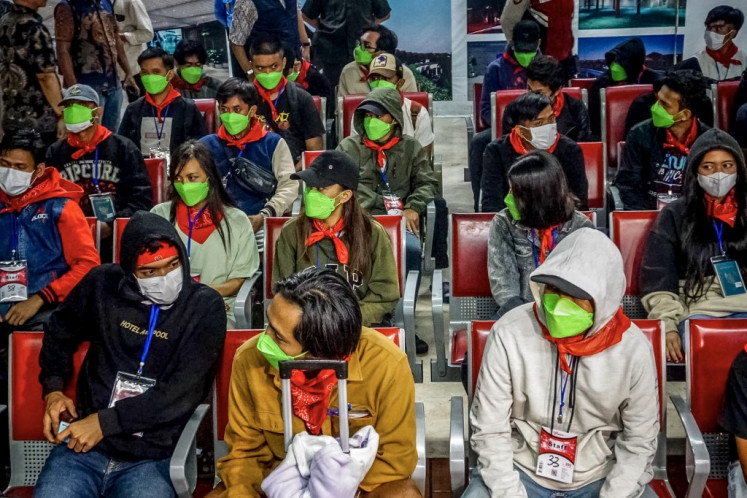Popular Reads
Top Results
Can't find what you're looking for?
View all search resultsPopular Reads
Top Results
Can't find what you're looking for?
View all search resultsMaids: From transnational exploitation to transnational strategy
The government’s anticlimactic response to the execution of migrant worker Ruyati binti Satubi and, most recently, the death of housemaid Siti Nurjamilah in Saudi Arabia, reflects the government’s failure to not only to revise migrant worker protection regulations but also to build global awareness of the transnational pattern of violence carried out against domestic workers
Change text size
Gift Premium Articles
to Anyone
T
he government’s anticlimactic response to the execution of migrant worker Ruyati binti Satubi and, most recently, the death of housemaid Siti Nurjamilah in Saudi Arabia, reflects the government’s failure to not only to revise migrant worker protection regulations but also to build global awareness of the transnational pattern of violence carried out against domestic workers. Or to be exact, their commodification.
The issue is very important for the migration process of these workers. Based on data from the International Labor Organization (ILO) between 2008-2010, three quarters of documented, Indonesian migrant workers were women and most of them were employed as domestic workers. Therefore, measures to protect migrant workers should be in line with national strategies that have also been designed for their protection.
The needs of domestic workers in both their countries of origin and destination stem from the same situations: No one is responsible for household duties because both wife and husband work or because they are not able share household duties equally. In both cases, families often recruit a housemaid.
The problem is that the home countries of these workers, including Indonesia, have historically and culturally applied the model of live-in employment. This ignores the concepts of eight-hour working days and professional working relations.
There are no employment relations, only relations of kinship and loyalty. A culture of violence against domestic workers is also historically rooted in their countries of origin.
Where the Gulf Cooperation Council (GCC) countries have received migrant domestic workers, the model of live-in domestic workers is historically less well-known by the employing families.
While the failure of equal division of roles in the household persists, the model of live-in domestic workers, promoted by housemaids’ countries of origin, including Indonesia, has become a tempting option for families living in the GCC countries.
Through the 1995 Uruguay Round, the World Trade Organization (WTO) produced the General Agreement on Trade in Services (GATS). This lays forth the rules of global distribution of unskilled and skilled persons in the service sectors. It is not surprising that the existence of unskilled reserves, including migrant domestic workers, is maintained because free trade in services requires it.
As long as some unskilled sectors are deemed as a marketable commodity, the sectors must be sustained by member states that recognize these unskilled sectors. This is what happened to the domestic work services sector during the debate on free trade and migration.
The legitimacy of the need to distribute the service sectors on the basis of the division of labor of skills has proved an obstacle for the agenda of skill improvement, both within the frameworks of the national and regional program.
The national and regional agendas of skill improvement prove powerless when faced with the domination of global policies supporting sustainable unskilled jobs.
For migrant domestic workers, the selling of their labor power to destination countries may be the only option for them while there is little chance for skill improvement.
Given the transnational pattern and global trade of domestic workers as commodities, revising the protection rules for migrant workers, especially migrant domestic workers, so that they have a long-term purpose is a must for Indonesia.
But with the government currently tending to compromise the distribution of Indonesian workers as low-skilled reserves, it is not surprising that the prevailing Migrant Workers’ Law is dominated by placement clauses, rather than clauses of protection.
Repatriating migrant workers from Saudi Arabia and other diplomatic actions does not prove the Indonesian government’s commitment to the protection of these workers. The government should change its political stance and come out against the commodification of unskilled reserves. But again, the most important thing is to build a transnational strategy to bridge the gap between strategies in both countries of origin and destination.
This is important because the exploitation of domestic workers in their countries of origin and destination originates from a single root: families caught up in gender inequality feed the market of domestic services trade.
If only gender equality could form part of policies that are related to migrant workers worldwide and not merely restricted to the mobility of women in the public domain. Perhaps then, the exploitation of migrant domestic workers might be overcome. Indicators such as day care facilities, household work training centers for men and child psychological education centers for parents, all provided by the government, will encourage citizens to perform household duties in the spirit of equality.
Global programs that aim to promote gender equality from the likes of the Social Institution and Gender Index (SIGI), should take these indicators into account.
Many developed countries, especially in Scandinavia, have proved that facility-based gender equality programs have changed perspectives toward migrant domestic workers.
Gender equality in the domestic domain has reduced the amount of live-in domestic migrant workers, but these kinds of workers have not been abolished altogether.
In Norway, for example, migrant domestic workers are professionally facilitated by the Norwegian Directorate of Immigration, a state agency that standardizes contracts, limits working hours and regulates wages, and all this for relatively light work.
Most household duties remain the responsibility of family members, not domestic workers. It can be said that employing this strategy in destination countries can serve to reduce the exploitation of migrant domestic workers.
For Indonesia, the challenge is more severe. From looking at the global trade in services, Indonesia is a country of origin for domestic workers. The GCC represents a huge market for these workers.
The Indonesian government should gauge the standardization measures implemented by destination countries. Looking at eligibility standards adopted in countries such as Norway, the government should ensure that such standards have a transnational focus and can be a realistic option for sending migrant workers overseas.
If standardization measures do not meet elements of professionalism and protection that should be afforded to migrant domestic workers, then the right choice is to not send migrant workers abroad.
Setting minimum standards that are then met by destination countries is the responsibility of the National Agency for the Placement and Protection of Indonesian Migrant Workers (BNP2TKI).
These standards include employment contracts, minimum wage, restriction of working hours, the type of work and insurance. Most importantly, these standards show that there is a state agency responsible for their implementation.
In short, the BNP2TKI should no longer serve as an agency that places migrant workers abroad, but as a supervisor of the standards of professionalism and protection of migrant workers overseas.
Of course, such standards should be reflected at home so that destination countries take into account this new culture of respecting domestic workers.
The writer is a lecturer and researcher on feminist legal issues at the Faculty of Law, Padjadjaran University, Bandung.










